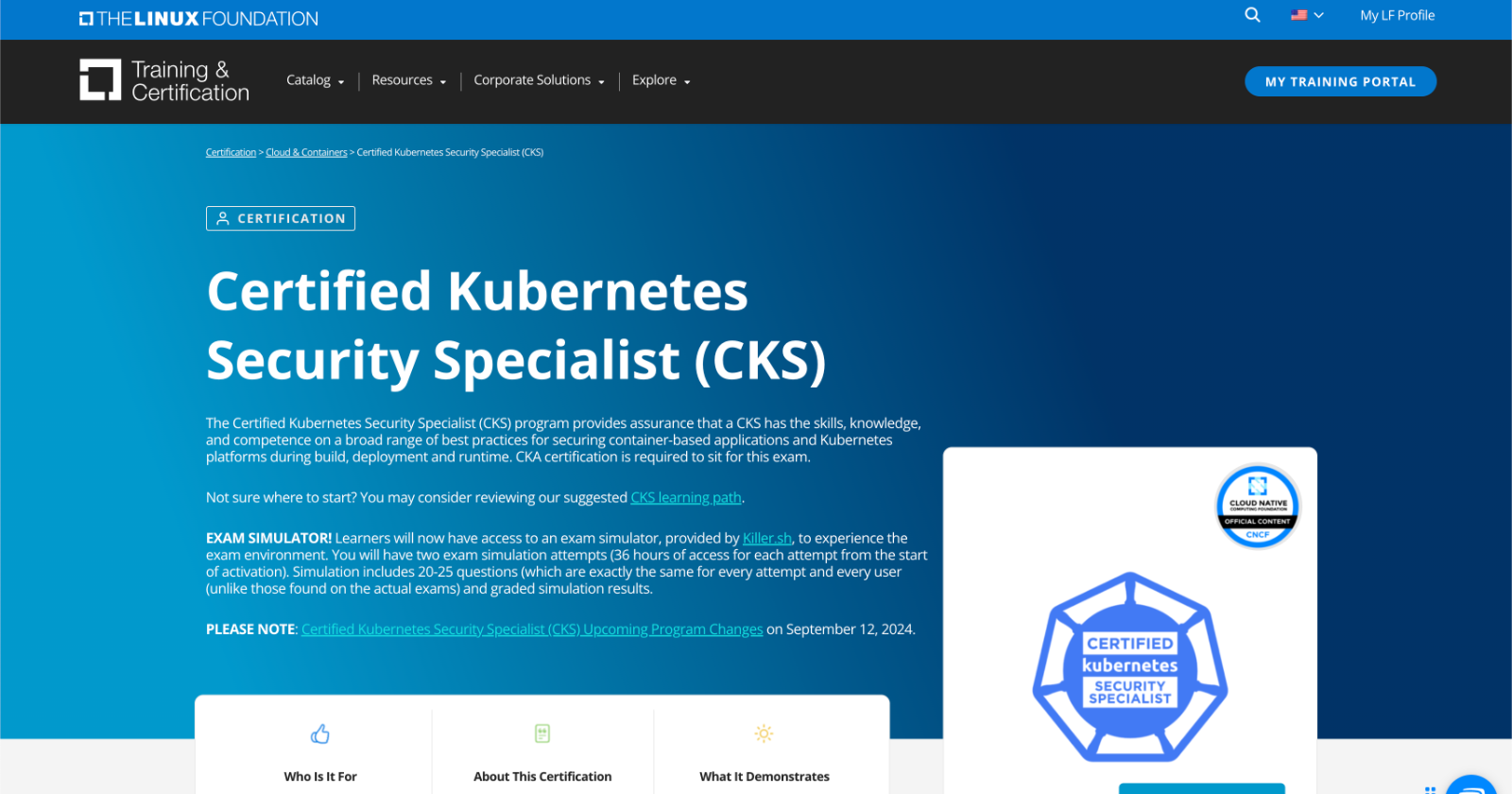Enhancing Your Career with CKS Certification
 Aaron Williams
Aaron Williams
Introduction
Curious if the CKS (Certified Kubernetes Security Specialist) Certification is the right choice for you? In this blog post, I’ll share my journey in obtaining this certification and what it took to pass on my first attempt. My primary motivation was to advance my career and learn the best practices for implementing security within Kubernetes.
So, what exactly is the CKS certification? The CKS is the third, and most difficult, in the Kubernetes certification “trifecta”. According to The Linux Foundation, it equips you with the “skills, knowledge, and competence on a broad range of best practices for securing container-based applications and Kubernetes platforms during build, deployment and runtime” But what does that actually mean? Let’s dive in!
Preparation Journey
First of all, the CKA certification is required to sit for this exam, so you should at least have a base knowledge of administering a Kubernetes cluster. The exam assumes you know the basic kubectl commands and you can navigate your way around a Kubernetes cluster. The two resources I used for preparation were https://kodekloud.com/ and https://killercoda.com/. You get two free practice exams at https://killer.sh when you purchase the exam, but I did not take advantage of them. The primary reason for skipping the Killer.sh practice exams is that they are notorious for being overly difficult, and I wanted to avoid over preparing for the exam.
My study schedule varied from week to week, depending on what was happening around me. Life happens, and it’s essential to find time to be consistent. I recommend dedicating at least an hour per day to studying. I approached it in three phases: watching videos on KodeKloud, repeating practice exams on KodeKloud, and going through training labs on KillerCoda.

Phase One
In phase one, focus on watching the videos and complete the quizzes and labs along the way. Ensure that you can fully concentrate on learning. If you find yourself getting distracted, take a break or stop for the day. Remember, it’s a marathon, not a sprint. Taking notes through each lesson can help me organize my thoughts and keep me focused. This phase will likely take the longest to complete.
Phase Two
In phase two, I move on to the practice exams. Since KodeKloud provides unlimited access to these exams, you should be able to take them effortlessly by the time you’re done with this phase. I find it best to take at least one or two exams per day and repeat them the next day. This approach helps you become increasingly familiar with the questions and commit solving them to muscle memory. It’s okay if you know the answer before you finish reading the question; the real goal is to commit these solutions to memory, which will help you manage the exam time limit effectively.
Phase Three
Finally, in phase three, use the second study resource, KillerCoda, to fill in any knowledge gaps and gain a different perspective. Feel free to repeat the practice exams as necessary leading up to your exam date. I don’t recommend spending too much time in this phase. Scheduling your exam now can help ensure you stay on track and focused.
Final Preparations
The last bit of preparation is ensuring you are well-rested and in good physical and mental condition on the day of your exam. I recommend eating a healthy diet and maintaining regular physical activity in the days leading up to your exam. Being in your best physical and mental state will definitely make a difference during the exam.
Exam Experience
Finally, it’s time to take the exam. You’ll have 2 hours to complete 15 to 20 questions. The exam is proctored and taken within a virtual desktop environment. Although there are many negative reviews of the desktop environment online, my experience was mostly positive. The most challenging part was getting used to the special commands for copying and pasting. Almost every question includes links directly to the documentation for the required resources.
I believe your biggest enemy on the exam is time. I took the full 2 hours and only completed 14 of 16 questions. If I were to take the exam again, there are a couple of things I would do differently. First, I wouldn’t spend as much time reviewing answers when I was mostly confident they were correct. The last thing I wanted was to miss an easy question due to an incorrect resource name. However, with time being a major issue, I didn’t have the luxury to double-check everything. Rely on copy/paste and trust that you’ve done it correctly. Secondly, be sure to skip any questions you are stuck on or that will take a long time to finish. You can flag questions and return to them later. Grab the easy points first and come back later to better manage your time.
Once you finish, go celebrate. It’ll most likely take 24 hours to get your results, but you’ve earned some rest and relaxation after this stressful event.
Career Impact and Benefits
I believe the CKS is one of the best certifications you can obtain to advance your career. It’s a challenging exam that requires hands-on experience and in-depth knowledge. Pursuing the Certified Kubernetes Administrator (CKA) certification was one of the best decisions I’ve made for my career, and I believe the CKS can have a similar impact.
Once you’ve established yourself as an experienced Kubernetes engineer, security becomes the next crucial aspect of your role. Kubernetes is large and complex, making security even more challenging. Security is always necessary and is becoming increasingly important each day. The CKS provides an excellent baseline of knowledge to help you start applying these best practices.
The exam covers the following topics:
Cluster Setup
Cluster Hardening
System Hardening
Minimize Microservice Vulnerabilities
Supply Chain Security
Monitoring, Logging and Runtime Security
Some of my favorite topics included auditing, webhooks, hardening configurations, and security scanning of images, clusters, and manifest files. These are all skills I can bring back to my current role to make an immediate impact. I believe you can do the same. Your career progresses by providing value to your team, and this certification is a great way to achieve that goal.
Conclusion
I highly recommend the CKS or any other Kubernetes-related certifications to anyone interested in the field. My experience since starting my journey has been extremely fun, fulfilling, and full of challenges that have helped me grow. The key to progress is staying consistent and pursuing growth. Don’t be afraid to fail; every “failure” is a new opportunity for growth.
The CKS has been exactly that for me — an opportunity for growth, to go beyond the norm, and provide more value to those around me.
Thank you for taking the time to read about my experience obtaining the CKS. I would be happy to answer any additional questions you might have about the exam and my experience. Feel free to connect with me on LinkedIn at https://www.linkedin.com/in/aaronmawilliams/
Subscribe to my newsletter
Read articles from Aaron Williams directly inside your inbox. Subscribe to the newsletter, and don't miss out.
Written by

Aaron Williams
Aaron Williams
Hey there! I'm Aaron Williams, a seasoned DevOps engineer and consultant with a passion for all things Kubernetes and cloud-native technologies. My mission is to streamline software development pipelines, making them more efficient and reliable using Kubernetes magic. I'm a proud member of the CNCF (Cloud Native Computing Foundation) community and love diving deep into the Kubernetes ecosystem. When I'm not orchestrating containers, you can find me crafting software solutions using my favorite programming languages - JavaScript, Python, and Golang. I believe in the power of automation and strive to simplify complex problems through code. Join me on my tech journey as I explore the world of DevOps, Kubernetes, and software engineering. Let's innovate and build together!